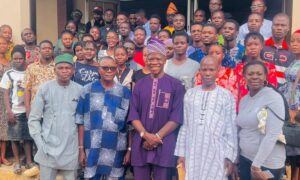Nigeria is set to receive a $1.08 billion financial boost from the World Bank to improve education, tackle malnutrition, and enhance economic resilience. This funding comes through three major initiatives aimed at uplifting underserved communities and strengthening key sectors.
A statement from the World Bank confirmed the approval, stating, “The World Bank has approved three operations in Nigeria, totaling $1.08 billion in concessional financing, to enhance education quality, build household and community resilience, and improve nutrition for underserved groups.”
The allocation includes $500 million in additional financing for the Community Action for Resilience and Economic Stimulus (NG-CARES) Programme, $80 million for the Accelerating Nutrition Results in Nigeria (ANRIN 2.0) initiative, and another $500 million for the Hope for Quality Basic Education for All (HOPE-EDU) programme.
The NG-CARES Programme was initially designed to cushion the economic impact of the COVID-19 pandemic. With this new funding, the initiative will continue to support livelihood programs, food security services, and grants for vulnerable households. Already benefiting over 15 million Nigerians, the programme has evolved into a broader platform providing social assistance, public works employment, and financial support for small businesses. This expansion is especially crucial as Nigeria navigates economic pressures following the 2023 fuel subsidy removal and foreign exchange rate unification.
ANRIN 2.0 is focused on tackling malnutrition, particularly among pregnant women, nursing mothers, adolescent girls, and children under five. The initiative builds on the success of its predecessor, which reached over 13 million children between 2018 and 2024. With an emphasis on improving maternal and child health, ANRIN 2.0 aligns with Nigeria’s National Development Plan (2021–2025) by promoting preventive nutrition strategies, better feeding practices, and greater access to nutrient-rich foods.
HOPE-EDU, the third initiative, is set to transform Nigeria’s basic education system by strengthening foundational literacy and numeracy. The programme aims to directly benefit 29 million public primary school pupils, 500,000 teachers, and over 65,000 public primary schools. It also seeks to tackle school overcrowding and streamline education funding allocation. Additionally, HOPE-EDU will receive a $52.18 million co-financing boost from the Global Partnership for Education Fund.
Speaking on the importance of these investments, World Bank Country Director for Nigeria, Dr. Ndiamé Diop, emphasized, “Investing in human capital is critical for Nigeria as it offers the best opportunity to unlock the enormous potential of Nigeria. These new programmes will help accelerate education quality and support vulnerable citizens. The HOPE-EDU programme will enable better education outcomes by implementing bold reforms and making the right investments to equip the fast-growing young population with foundational skills necessary for rapid and inclusive economic growth.”
Diop also highlighted how ANRIN interventions will improve access to micronutrient-rich foods and essential nutrition services at the primary healthcare level. Meanwhile, the NG-CARES funding will play a crucial role in Nigeria’s transition from pandemic recovery to long-term economic resilience.
These initiatives mark a significant step toward addressing critical challenges in Nigeria, with a focus on empowering communities through education, nutrition, and sustainable economic support.
The Students Forum Nigeria serves as the ultimate hub for Nigerian students, fostering academic growth, social engagement, and knowledge sharing.












